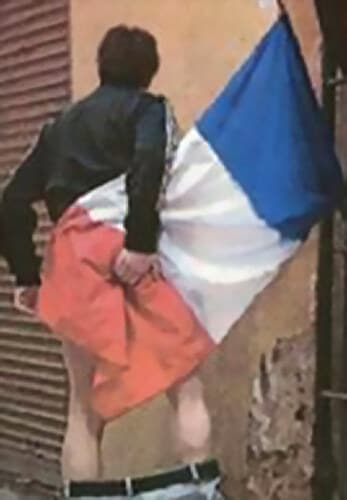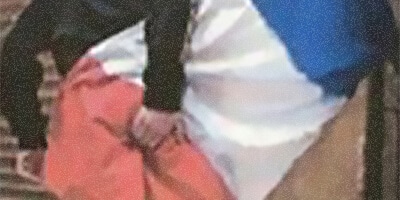Contempt of the flag... Attention! Here we go!
Three teenage girls in custody for burning French flags
They are 16 and 17 years old, and had run away from the home where they were placed: three young girls have been in custody since yesterday evening, after being arrested in Chevilly-Larue, in the Paris suburbs. They had just burned and thrown away two French flags taken from the town's war memorial.
Contempt of the flag is now punishable by a fine of 1,500 euros, according to a decree of the Ministry of Justice published in July 2010 in the Official Journal.
Source : http://www.france-info.com
In the midst of the tragic events in Japan and the massacres in Libya, this information may go relatively unnoticed. Nevertheless, in my opinion, it is an extremely serious indicator of the direction of current French policy towards freedom of expression. I am very worried that such warning signs of a notorious loss of democratic freedoms, if any were needed, do not raise more reaction within the public opinion and the media, except on a few sites like rue89. This condemnation follows the decree of July 2010 issued after the mini scandal of a photo contest on the theme of "Politically Incorrect" organised by the Fnac in Nice in March 2010, where the "jury's favourite" photo represented a man wiping himself with the French flag. Madame Alliot-Marie, whose uprightness was recently appreciated, immediately took the necessary steps to ensure that any act, including representations, that might constitute an insult to the French flag would be prohibited and condemned by law.
Whatever the artistic, ideological, or seemingly childish motivation for these acts, which are now listed as reprehensible, it is particularly serious to legitimise their condemnation from an ethical point of view, rather than simply as damage to public property, when it is, for example, a flag taken from a national building.
Beyond the freedom of expression, it is fundamental to realise that the sacralisation of national symbols constitutes an immensely open door to the negation of the individual.
To officially declare any symbol sacred is to prevent any strong iconographic criticism of a regime or institution. And we all know what impact images can have. It is to have the firm intention of eradicating the "shock" of consciences as a means of challenging one's fellow citizens and provoking reflection. Finally, it means ratifying the notion of 'good' as being unalterably linked to the authorities, thus rendered holy and indisputable.
Although France's responsibility for the deportation of the Jews was officially recognised by the Conseil d'Etat in 2009, we do not readily recognise ourselves as the heirs of a criminal country that knowingly collaborated with Nazism. However, there was a sad example in our recent history to taint our immaculate flag.
Far from insulting the resisters or the country itself, acts of defacement, a fortiori artistic, of our symbols, constitute discourses that can be essential to keep alive the debate and the healthy uncertainty about the very debatable permanence of the spirit of justice in a nation. We are not the 'good guys', born forever of the revolutionary spirit of 1789 and the Declaration of the Rights of Man. It would still be necessary for our highest institutions to respect its precepts on a daily basis.

"Article 11 - The free communication of thoughts and opinions is one of the most precious rights of man; every citizen may therefore speak, write and print freely, except for the abuse of this freedom in the cases determined by the law.
In this case, there is no abuse in taking photos and showing your views, any more than there is in burning a piece of blue-white-and-red fabric if you buy it at your own expense.
On the contrary, the abuse is elsewhere, on the side of a moralising and political power that arrogates to itself the right to dictate to each and every one of us what our thoughts must express in order to be considered worthy of being human.
"PREAMBLE TO THE CONSTITUTION OF 27 OCTOBER 1946
...Any property, any enterprise, the operation of which has or acquires the characteristics of a national public service or a de facto monopoly, must become the property of the community.
...and not the other way around. Nowhere does it say that we must be and become slaves to our symbols and what they represent.
This is in substance why I consider, from the height of my anonymity as a small Frenchman, that we are being chained by our leaders to decisions that are all the more consequential because they are based on events that could easily pass for anecdotal in such a heavy world context.
On this subject, I would very much like the reactions of intellectuals who are much more prominent than I am, so that people's minds may be more alert to the profound significance of such measures once they are formatted and written into our laws.
Related article: | The love of another utopia | Hate in its time










